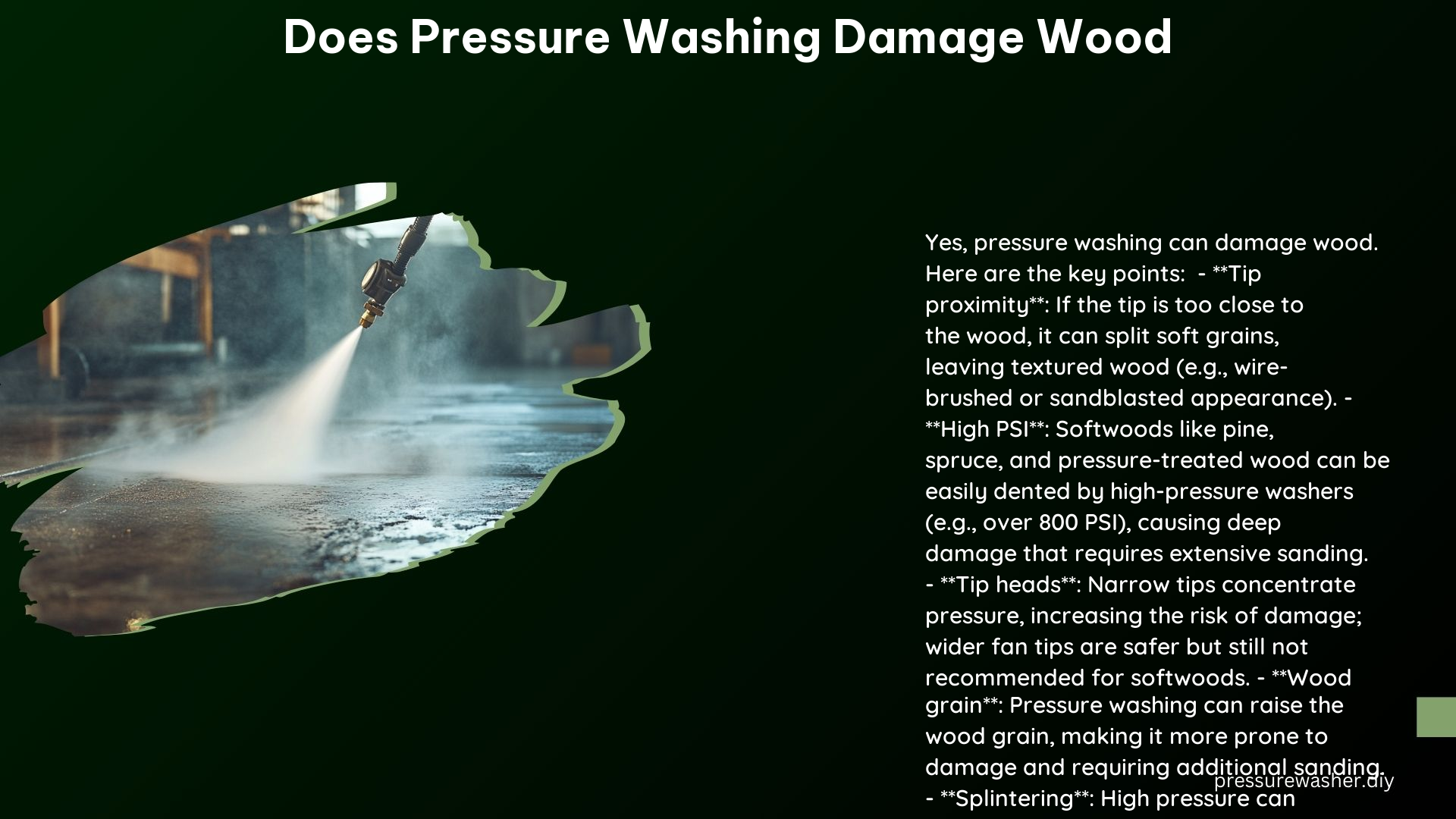Pressure washing can be an effective way to clean and maintain wood surfaces, but if not done correctly, it can also cause significant damage. From splintering and fragmentation to denting and raised grain, the risks of pressure washing wood are real and must be addressed. In this comprehensive guide, we’ll dive deep into the potential risks, best practices, and technical specifications to ensure your wood surfaces remain unharmed.
Risks of Damage
Wood Splintering
High-pressure water can cause wood to splinter, especially if the pressure washer is held too close to the surface. This can lead to raised wood fibers that require extensive sanding to repair. The risk of splintering is higher in softwoods, such as pine and cedar, compared to hardwoods like oak and maple.
| Pressure Setting | Splintering Risk |
|---|---|
| 500 PSI | Low |
| 800 PSI | Moderate |
| 1000 PSI | High |
Composite Wood Fragmentation
Pressure washing can also damage composite wood surfaces, such as those found in many modern decks and fences. The high pressure can chip away at the composite material, leading to wear and tear over time. To mitigate this risk, it’s recommended to use low pressure (no more than 800 PSI) and a pressure regulator to control the output.
Wood Denting
Softwoods, like pine and cedar, are particularly prone to denting when exposed to high-pressure water. This can lead to deep, unsightly damage that requires extensive sanding and refinishing to repair. The risk of denting increases as the pressure setting rises.
| Wood Type | Denting Risk at 800 PSI | Denting Risk at 1000 PSI |
|---|---|---|
| Softwood | Moderate | High |
| Hardwood | Low | Moderate |
Tip Too Close to Wood
If the tip of the pressure washer is held too close to the wood surface, the concentrated stream of water can split the soft wood grains, leaving a textured and uneven surface. The recommended distance from the tip to the wood surface is at least 8 inches.
| Tip Distance | Grain Splitting Risk |
|---|---|
| 6 inches | High |
| 8 inches | Moderate |
| 10 inches | Low |
Raises Wood Grain
Pressure washing can raise the wood grain, leading to a rougher surface texture. This can occur even when using the recommended pressure settings and tip distance. To mitigate this risk, it’s essential to use the correct technique, such as moving the wand with the grain of the wood.
Best Practices to Avoid Damage

Use Appropriate Tips and Pressure Settings
Employ fan tips with a minimum angle of 30 degrees and keep the pressure setting below 800 PSI to avoid damaging the wood. Higher pressure settings and narrower tips increase the risk of splintering, denting, and grain raising.
Maintain a Safe Distance
Consistently maintain a distance of at least 8 inches between the pressure washer tip and the wood surface. This helps prevent concentrated water streams from splitting the wood grains.
Use Low to Moderate Pressure
Avoid using high-pressure settings, especially on softwoods, to prevent denting and splintering. Start with a lower pressure setting and gradually increase it if necessary.
Utilize a Wide Fan
A wide fan tip is safer for softwoods, as it disperses the water pressure more evenly across the surface, reducing the risk of localized damage.
Practice Proper Technique
Develop the correct stroke technique, moving the wand with the grain of the wood to minimize the impact on the surface.
Alternatives to Pressure Washing
Garden Hose with Wide Fan Setting
Using a garden hose with a wide fan setting can be a gentler and more effective way to clean wood surfaces without the risk of damage. This method may require more elbow grease, but it’s a safer alternative to pressure washing.
Technical Specifications
| Specification | Recommended Value |
|---|---|
| Pressure Setting | No more than 800 PSI |
| Tip Angle | At least 30 degrees |
| Tip-to-Surface Distance | At least 8 inches |
References
- Treated Wood. (n.d.). Is Pressure Washing Bad for My Deck? Retrieved from https://www.treatedwood.com/news/is-pressure-washing-bad-for-my-deck
- YouTube. (2014). Can Power Washing Damage Your Wood Deck? Retrieved from https://www.youtube.com/watch?v=Bf4NJ1n4uPU
- Reddit. (2023). Pressure washing dirty wood, I could watch this all day. Retrieved from https://www.reddit.com/r/oddlysatisfying/comments/14olsx1/pressure_washing_dirty_wood_i_could_watch_this/
- Advantage Pro Services. (2022). Can Pressure Washing Damage Wood. Retrieved from https://advantageproservices.com/blog/can-pressure-washing-damage-wood/
- Sand & Stain. (2024). 5 Reasons You Should Never Pressure Wash Your Wood Deck. Retrieved from https://www.sand-stain.com/blog/5-reasons-you-should-never-pressure-wash-your-wood-deck
